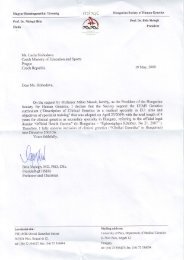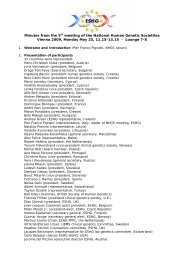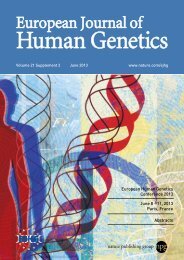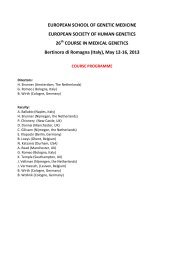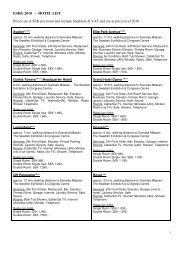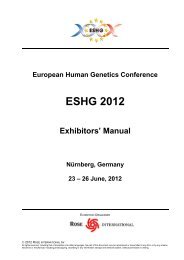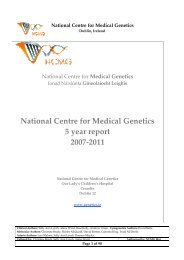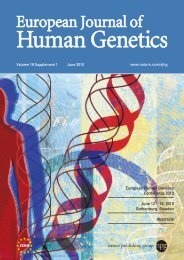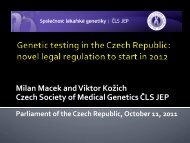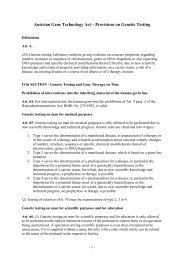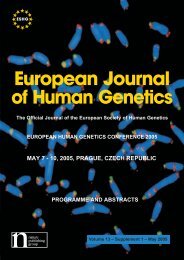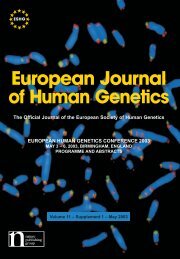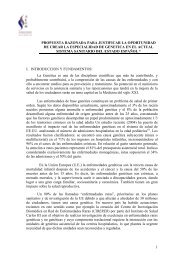2008 Barcelona - European Society of Human Genetics
2008 Barcelona - European Society of Human Genetics
2008 Barcelona - European Society of Human Genetics
Create successful ePaper yourself
Turn your PDF publications into a flip-book with our unique Google optimized e-Paper software.
EMPAG Posters<br />
EP10. Genetic counselling: communicating<br />
genetic information<br />
EP10.01<br />
Pitfalls in communicating 5-Probe FisH results- Lessons learned<br />
in genetic counselling<br />
M. I. Ross1 , G. McGillivray2 ;<br />
1 2 Victorian Clinical <strong>Genetics</strong> Services, Clayton, Victoria, Australia, Murdoch<br />
Childrens Research Institute, Melbourne Victoria, Australia.<br />
In Victoria Australia, all pregnant women are <strong>of</strong>fered serum screening<br />
to identify those fetuses which are considered to be at an increased<br />
risk for Trisomy 21, Trisomy 18 and Neural Tube defects . Women returning<br />
an increased risk may be counselled by their general practitioner,<br />
obstetrician, midwife or genetic counsellor, and are <strong>of</strong>fered<br />
diagnostic testing . Many choose to have a FISH analysis as part <strong>of</strong> the<br />
diagnostic testing .<br />
I present a number <strong>of</strong> women who experienced a normal FISH result<br />
from diagnostic testing, many believing that this was the complete result<br />
. They were later found to have a (different) abnormal karyotypean<br />
event that caused distress and confusion .<br />
I discuss their varied reactions and emotions in response to this<br />
“changed” result, and how they addressed the unexpected and difficult<br />
decision-making that followed .<br />
Examination <strong>of</strong> these cases highlights the need to exercise great care<br />
when giving and discussing prenatal FISH results in the setting <strong>of</strong> increased<br />
risk for aneuploidy via serum screening . Clearer information<br />
given when the test is <strong>of</strong>fered may alleviate these situations, but does<br />
little to reduce anxiety . The cases also demonstrate a need to provide<br />
ongoing education for health pr<strong>of</strong>essionals who <strong>of</strong>fer these tests to<br />
their clients, <strong>of</strong>ten also believing that the normal FISH result is an accurate<br />
description <strong>of</strong> the final result.<br />
EP10.02<br />
Family Perspectives on inherited Arrhythmia services<br />
C. R. Honeywell1,2 , B. Wilson2 , R. Gow1 ;<br />
1 2 Children’s Hospital <strong>of</strong> Eastern Ontario, Ottawa, ON, Canada, University <strong>of</strong><br />
Ottawa, Ottawa, ON, Canada.<br />
Assessing the interests and experiences <strong>of</strong> individuals affected by genetic<br />
conditions is an important component <strong>of</strong> service development . In<br />
the genetic arrhythmia literature, there is a paucity <strong>of</strong> information about<br />
what both affected and at-risk family members feel are the important<br />
elements <strong>of</strong> their care . We present the results <strong>of</strong> an anonymised survey<br />
administered to patients and their relatives who have been assessed<br />
for genetic arrhythmia through the CHEO Inherited Arrhythmia Clinic .<br />
A response rate <strong>of</strong> 52% was achieved with online and postal surveys .<br />
The respondents were 55 individuals (45% male) from 25 families,<br />
aged 14 to 70+ years who attended the clinic because <strong>of</strong> diagnosed or<br />
suspected long QT syndrome, arrhythmogenic right ventricular cardiomyopathy,<br />
or catecholaminergic polymorphic ventricular tachycardia .<br />
Results: Respondents perceive education and protective follow-up<br />
care to be the most important roles <strong>of</strong> an inherited arrhythmia service .<br />
Healthcare decision-making and support also emerged as important<br />
roles. At the first appointment, primary information needs concern the<br />
heart condition itself, long-term outcomes, and restriction <strong>of</strong> activities .<br />
Support group information is a low priority initially, but emerges later<br />
as an important requirement . With respect to timing <strong>of</strong> genetic counselling,<br />
respondents indicated no strong preference for counselling in<br />
advance, same-day or after heart investigations . However, 70% <strong>of</strong> respondents<br />
expressed that the location <strong>of</strong> counselling matters; the majority<br />
expect face-to-face counselling in a private location. These findings<br />
provide insight into families’ preferences for inherited arrhythmia<br />
services, and how such services might be most optimally configured to<br />
meet their needs within inevitable resource constraints .<br />
EP10.03<br />
What physicians tell to individuals at risk <strong>of</strong> breast and ovarian<br />
cancer syndrome (HBOs) referred for genetic counselling.<br />
IMASS Spanish cohort<br />
E. Darder, B. Graña, A. Velasco, D. Fortuny, T. Ramón y Cajal, A. Torres, J.<br />
Sanz, C. López, N. Gadea, I. Mensa, C. Saura, J. Brunet, J. Balmaña;<br />
IMASS, <strong>Barcelona</strong>, Spain.<br />
Background: Individuals at risk <strong>of</strong> HBOS are referred to genetic counselling<br />
units for genetic testing . It is unknown how much information<br />
these individuals get by their reference physicians before counselling .<br />
Materials and Methods: Spanish individuals at risk <strong>of</strong> HBOCS referred<br />
to genetic counselling were asked to participate in a multicenter study<br />
by fulfilling a self-completed questionnaire before BRCA1/2 testing .<br />
Variables were analysed using descriptive statistics and Fisher Exact<br />
test with SPSS .<br />
Results: Overall, 243 individuals were enrolled . Median age was 44<br />
years (range 19-88), 88% were women and 67% had a previous diagnosis<br />
<strong>of</strong> cancer . Most participants (65%) were referred by a physician,<br />
30% by a relative and 5% were self-referred . The reference physician<br />
did not inform 48% <strong>of</strong> individuals about their risk <strong>of</strong> developing cancer,<br />
<strong>of</strong> those informed 70% were told to have a higher cancer risk than the<br />
average population . Physician informed 46% <strong>of</strong> total individuals about<br />
the possibility <strong>of</strong> genetic testing recommending it to 37% . Seventyfive<br />
individuals (31%) did not received any information about genetic<br />
counselling/testing before their risk assessment visit, while the main<br />
information source for 74 (30%) was the media . A similar proportion <strong>of</strong><br />
cancer patients and healthy individuals at risk <strong>of</strong> HBOS received previous<br />
information by the reference physician (53% vs . 49%, p=0 .58) .<br />
Conclusions: A low percentage <strong>of</strong> individuals at risk <strong>of</strong> HBOS are informed<br />
by their reference physician about their cancer risk and genetic<br />
predisposition before genetic counselling . Further efforts have<br />
to be done to improve medical awareness about hereditary cancer<br />
syndromes .<br />
EP10.04<br />
Cancer Knowledge, Risk Perception, and Cancer Worry after<br />
Genetic counselling for Hereditary Breast cancer in spain.<br />
E. Cabrera 1 , A. Zabalegui 1 , M. Peris 2 , I. Blanco 2 ;<br />
1 Universitat Internacional de Catalunya, <strong>Barcelona</strong>, Spain, 2 Genetic Counseling<br />
Unit. Prevention and Cancer Control Department. Catalan Institute <strong>of</strong> Oncology,<br />
L’Hospitalet, Spain.<br />
Identification <strong>of</strong> a genetic basis underlying breast cancer has led to an<br />
increase in demand for genetic counselling about individual risks <strong>of</strong> the<br />
disease . Genetic Counselling Units are becoming an integral part <strong>of</strong><br />
cancer services . It is, therefore, important to assess how attendance at<br />
these clinics impacts on cancer knowledge, cancer-related concerns,<br />
and risk perceptions . Previously, we have reported a validation <strong>of</strong> a<br />
Spanish Translation <strong>of</strong> the Cancer Worry Scale, Escala de Preocupación<br />
por Cáncer, which can be used to asses cancer worry in the<br />
setting <strong>of</strong> genetic counselling . A total <strong>of</strong> 212 Spanish patients were<br />
consecutively recruited, and 152 completed all questionnaires before<br />
and one and 6 months after genetic counselling . Cancer knowledge,<br />
including breast cancer prevention measures, significantly increases<br />
after genetic counselling . Patients’ risk perception did not correlate<br />
with the actual breast cancer risk calculated by the counsellors . Patients’<br />
perceived risk did not modify after genetic counselling . Patients<br />
were significantly less worried after counselling. Higher levels <strong>of</strong> worry<br />
were predicted by high degree <strong>of</strong> perceived risk <strong>of</strong> developing cancer,<br />
higher levels <strong>of</strong> anxiety and low level <strong>of</strong> education . In conclusion, counsellors<br />
met the patients’ psychological needs to a satisfactory degree<br />
during counselling . However, patients did not fully understand their risk<br />
<strong>of</strong> developing cancer .<br />
EP10.05<br />
Breast cancer Genetic counselling in cyprus: First<br />
epidemiological data<br />
V. C. Anastasiadou 1,2 , E. S Aristidou 1 , A. Hadjisavvas 3 , Y. Marcou 4 , E. Kakouri 4 ,<br />
T. Delikurt 1 , K. Kyriacou 3 ;<br />
1 Clinical <strong>Genetics</strong> Service, Cyprus Institute <strong>of</strong> Neurology and <strong>Genetics</strong>, Nicosia,<br />
Cyprus, 2 Makarios Medical Centre, Nicosia, Cyprus, 3 Department <strong>of</strong> Electron<br />
Microscopy and Molecular Pathology, Cyprus Institute <strong>of</strong> Neurology and Genet-



